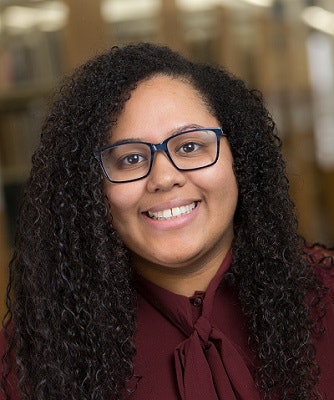Being the first in my family to attend college is not only a privilege, it’s a wonderful honor and gives me a great sense of responsibility. As a first-generation college student from a working class family, college was the exception not necessarily the rule. Through my modest upbringing, pursuing education was a topic of conversation, as an expectation that my parents had for me even though they weren’t aware of the college process. My family has always been supportive of my academic endeavors, even if the college culture was foreign to them.
 Mercedes Terrazas
Mercedes TerrazasI remember wanting to attend college, but I had no idea how to get started. I ventured into the college culture, with high expectations for my college experience in pursue of my academic aspirations. DePaul University, was and continues to be a dynamic university campus with a myriad of activities, educational scholars and opportunities that enhance my skills.
During my undergraduate education, TRIO Student Support Services program staff and resources were vital in my determination and academic success. Since the beginning, I was a young motivated student, nevertheless, I needed guidance in making sure I enrolled in the correct courses and was held accountable for my educational and career goals amidst the barriers, and challenges that emerged during my four years at DePaul University. I joined the DePaul TRIO Student Support Services program sophomore year; joined the first cohort of Arnold Mitchem Fellows and transitioned to the DePaul TRIO McNair Scholars program where I engaged in an intentional curriculum that fostered critical thinking, personal awareness, engaged in research, study abroad experiences while enhancing my knowledge and skills in relation to my research interests and graduate school pursuits.
I know that deciding to join the TRIO Student Support Services program was one of the best decisions I’ve ever made. Who would’ve known that I would meet incredible like-minded individuals that fostered my passions, listened to my struggles, gave me vital advice, validated my experiences, and always encouraged my educational aspirations, career goals while giving me essential tools, resources, and opportunities to reach success?
TRIO programs are federally-funded by the U.S Department of Education. TRIO programs are a set of educational opportunity programs that motivate and support students from disadvantaged backgrounds in their pursuit of college degree attainment. According to the Council for Opportunity in Education, “the TRIO programs were the first national college access and retention programs to address the serious social and cultural barriers to education in America”.
TRIO programs are essential educational opportunity programs that are vital in promoting educational success, retention, persistence and providing pathways to immense opportunities for low-income, first-generation college students and students with disabilities from diverse backgrounds. According to the Council for Opportunity in Education “More than 812,000 low-income, first-generation college students and students with disabilities — from sixth grade through college graduation — are served by over 3,100 programs nationally”.
Let us not forget why we need TRIO programs — they serve as the necessary support for our diverse, underrepresented students that have been left behind by the institutional inequalities and inequities of society.
It is important to acknowledge that even though parents and siblings are supportive, families may not be able to offer students complete and comprehensive support throughout the entire college process. That is where programs such as TRIO Student Support Services are essential; by providing strategies, workshops, and resources to support students’ educational aspirations and tools to achieve academic success by exposing them to the college culture, particularly for those students that might be first in their family to attend college and are unfamiliar with the college process.
Reflecting on my time at DePaul University allows me to see how imperative the TRIO programs were in my academic and personal development. It is an honor to see my experiences, skills, and career goals come full circle as I currently work for the Project Achieve/TRIO Student Support Services (SSS) at Joliet Junior College, the nation’s first public community college. It is completely surreal. It is an honor to be in these academic spaces constantly working to increase access, equity, diversity, and inclusion for diverse students. I see myself in the diverse students I advise. I currently advise first-generation college students, low-income students, and students with disabilities. It is imperative that nationally we continue to support the educational endeavors of our disadvantaged, underserved, and diverse, particularly students of color.
As part of the TRIO SSS program we strategically formulate culturally conscious programming that is focused on academic success, academic perseverance and social/emotional health, while supporting our SSS grant goals. TRIO programs provide academic tutoring, personal counseling, mentoring, financial guidance and other support necessary for educational access, retention and completion. Through our intentional efforts we focus on building strong relationships with our diverse students to better serve and support their educational and professional endeavors.
However, the work continues, we must continue to advocate for the national support of TRIO which are vital educational opportunity programs that invest in the leaders of this nation. If you are a TRIO advocate, educator, professional, policymaker, TRIO alumni and higher education professional, you must commit to promote and intentionally advocate for our TRIO programs. I had the pleasure of attending the 38th Annual Policy Seminar with the Council for Opportunity in Education, where we advocated to our congressional representatives the importance of TRIO, the positive impact, and the necessity of their continuous support. As a result, TRIO funding reached $1 billion. Thus, it is imperative that academic spaces continuously promote access, diversity, equity and inclusion while intentionally cultivating inclusive academic pathways to better serve and support our diverse students.
It is evident that TRIO programs work, and we must continue to advocate for continuous funding for TRIO programs, the importance of TRIO programs in academic spaces, and sharing our success stories to demonstrate that the educational opportunity programs work. TRIO works.
Mercedes Terrazas is the Student Support Services Specialist for the Project Achieve/TRIO Student Support Services program at Joliet Junior College.















